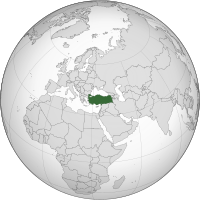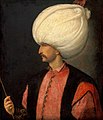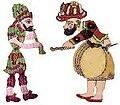
Summary
Merhaba! Türkiye portalına hoşgeldiniz. Hi! Welcome to the Turkey portal.
 | |

| |
Turkey, officially the Republic of Türkiye, is a country mainly in Anatolia in West Asia, with a smaller part called East Thrace in Southeast Europe. It borders the Black Sea to the north; Georgia, Armenia, Azerbaijan, and Iran to the east; Iraq, Syria, and the Mediterranean Sea (and Cyprus) to the south; and the Aegean Sea, Greece, and Bulgaria to the west. Turkey is home to over 85 million people; most are ethnic Turks, while ethnic Kurds are the largest ethnic minority. Officially a secular state, Turkey has a Muslim-majority population. Ankara is Turkey's capital and second-largest city; Istanbul is its largest city, and its economic and financial center, as well as the largest city in Europe. Other major cities include İzmir, Bursa and Antalya.
Human habitation began in the Late Paleolithic. Home to important Neolithic sites like Göbekli Tepe and some of the earliest farming areas, present-day Turkey was inhabited by various ancient peoples. Hattians were assimilated by the incoming Anatolian peoples. Increasing diversity during Classical Anatolia transitioned into cultural Hellenization following the conquests of Alexander the Great; Hellenization continued during the Roman and Byzantine eras. The Seljuk Turks began migrating into Anatolia in the 11th century, starting the Turkification process. The Seljuk Sultanate of Rum ruled Anatolia until the Mongol invasion in 1243, when it disintegrated into Turkish principalities. Beginning in 1299, the Ottomans united the principalities and expanded; Mehmed II conquered Istanbul in 1453. During the reigns of Selim I and Suleiman the Magnificent, the Ottoman Empire became a global power. From 1789 onwards, the empire saw major transformation, reforms, and centralization while its territory declined.
In the 19th and early 20th centuries, persecution of Muslims during the Ottoman contraction and in the Russian Empire resulted in large-scale loss of life and mass migration into modern-day Turkey from the Balkans, Caucasus, and Crimea. Under the control of the Three Pashas, the Ottoman Empire entered World War I in 1914, during which the Ottoman government committed genocides against its Armenian, Greek and Assyrian subjects. After its defeat, the Ottoman Empire was partitioned. The Turkish War of Independence resulted in the abolition of the sultanate in 1922 and the signing of the Treaty of Lausanne in 1923. The Republic was proclaimed on 29 October 1923, modelled on the reforms initiated by the country's first president, Mustafa Kemal Atatürk. Turkey remained neutral during most of World War II, but was involved in the Korean War. Coups in 1960 and 1980 interrupted the transition to a multi-party system.
Turkey is an upper-middle-income and emerging country; its economy is the 18th- or 11th-largest in the world. It is a unitary presidential republic. Turkey is a founding member of the OECD, G20, and Organization of Turkic States. With a geopolitically significant location, Turkey is a regional power and an early member of NATO. An EU-candidate, Turkey is part of the EU Customs Union, CoE, OIC, and TURKSOY. Turkey has coastal plains, a high central plateau, and various mountain ranges; its climate is temperate with harsher conditions in the interior. Home to three biodiversity hotspots, Turkey is prone to frequent earthquakes and is highly vulnerable to climate change. Turkey has universal healthcare, growing access to education, and increasing innovativeness. It is a leading TV content exporter. With 21 UNESCO World Heritage sites, 30 UNESCO intangible cultural heritage inscriptions, and a rich and diverse cuisine, Turkey is the fourth most visited country in the world. (Full article...)
Selected article -
The Walls of Constantinople (Turkish: Konstantinopolis Surları; Greek: Τείχη της Κωνσταντινουπόλεως) are a series of defensive stone walls that have surrounded and protected the city of Constantinople (today Istanbul in Turkey) since its founding as the new capital of the Roman Empire by Constantine the Great. With numerous additions and modifications during their history, they were the last great fortification system of antiquity, and one of the most complex and elaborate systems ever built.
Initially built by Constantine the Great, the walls surrounded the new city on all sides, protecting it against attack from both sea and land. As the city grew, the famous double line of the Theodosian Walls was built in the 5th century. Although the other sections of the walls were less elaborate, they were, when well-manned, almost impregnable for any medieval besieger. They saved the city, and the Byzantine Empire with it, during sieges by the Avar–Sassanian coalition, Arabs, Rus', and Bulgars, among others. The fortifications retained their usefulness after the advent of gunpowder siege cannons, which played a part in the city's fall to Ottoman forces in 1453 but were not able to breach its walls. (Full article...)General images
Did you know -
- ... that Baghdad Street in Istanbul was named by Murad IV to commemorate his conquest of Mesopotamia? (January 12, 2007) Wikipedia:Recent additions 116
- ... that in Rose Macaulay's novel The Towers of Trebizond (1956) the English traveller Aunt Dot aims to emancipate the women of Turkey by converting them to Anglicanism and popularizing the bathing hat? (November 19, 2007) Wikipedia:Recent additions 188
- ... that, when completed, the Deriner Dam will be the tallest in Turkey? (September 7, 2010)
- ... that following the assassination of Diyarbakır police chief Gaffar Okkan in 2001, more than a hundred babies were named after him? (February 7, 2014)
- ... that unlike other cemeteries in Turkey that accommodate one religion only, Mersin Interfaith Cemetery includes graves of Muslims, Christians and Jews? (January 15, 2014)
- ... that a hydro dam was built by a state agency within the borders of the Munzur Valley National Park in Turkey, violating the existing laws for its protection? (October 28, 2010)
- ... that Turkish political parties cancelled their rallies ahead of the local elections in respect of the death of Yazıcıoğlu, leader of the Great Union Party, in the 2009 Medair TC-HEK helicopter crash? (April 17, 2009) Wikipedia:Recent additions 243
Selected picture
Selected biography -
Juneyd or Junayd Bey (Turkish: İzmiroğlu Cüneyd; fl. before 1402 – 1425) was the last ruler (bey) of the Aydınid principality in what is now central western Turkey. His exact relationship with the Aydınid dynasty is unclear. His father was a long-time and popular governor of Smyrna under the Ottoman sultan Bayezid I. This allowed Junayd to consistently rely on the loyalty of the area's populace.
Bayezid was defeated by Timur at the Battle of Ankara, beginning a civil war for succession between his sons – a period known as the "Ottoman Interregnum". Taking advantage of the situation, Junayd attacked the Aydınid brothers, Isa and Umur II, who had been restored by Timur. By early 1406, Isa and Umur were dead and Junayd was the undisputed ruler of the former Aydınid domains. Like all the rulers of the region, Christian and Muslim alike, Junayd was also an active participant in the civil war between Bayezid's sons İsa, Süleyman, Musa and Mehmed, in which he changed his allegiance several times. He supported İsa against Mehmed, and became a vassal of Süleyman. His persistent attempts to exploit the conflict to broaden his power and independence forced Süleyman to send him as provincial governor of Ohrid in Rumeli in 1410. After Süleyman's overthrow and death in 1411 at the hands of his brother Musa, Junayd returned to Anatolia and seized Smyrna, but had to recognize the suzerainty of Mehmed. During Mehmed's absence in Rumeli to campaign against Musa, Junayd reclaimed his independence and attacked his neighbouring rulers. As a result, in 1414 Mehmed led a regional coalition against Junayd. Junayd's mother was able to save his life, but once again Junayd was dispossessed and sent to Rumeli as governor of Nicopolis. From there, he joined the unsuccessful rebellion of Mustafa Çelebi, until the Byzantines agreed to intern him and Mustafa in 1416. (Full article...)Selected video -
More selected videos
Videos from Turkey on Wikimedia Commons
Selected quote -
| “ | Heroes who shed their blood and lost their lives! You are now lying in the soil of a friendly country. Therefore rest in peace. There is no difference between the Johnnies and Mehmets to us where they lie side by side here in this country of ours. You, the mothers, who sent their sons from far away countries wipe away your tears; your sons are now lying in our bosom and are in peace. After having lost their lives on this land they have become our sons as well. | ” |
Turkish proverbs in Wikiquote
Recognized content
Provinces
Topics
Categories

Related portals
Religions in Turkey
Neighbouring countries
Countries with related heritage
WikiProjects
- European Union WikiProject
- Ottoman military history WikiProject
- Greek and Turkish wikipedians cooperation board
- European history WikiProject
- Eastern Europe WikiProject · Caucasia WikiProject
- Balkan military history WikiProject
- Islam WikiProject
- Countries WikiProject · Western Asia WikiProject
- Ancient Near East WikiProject
- Geography WikiProject
Turkish wikipedia
 |
There is a Turkish version of Wikipedia, the free encyclopedia. |
Wikimedia
The following Wikimedia Foundation sister projects provide more on this subject:
-
 Commons
Commons
Free media repository -
 Wikibooks
Wikibooks
Free textbooks and manuals -
 Wikidata
Wikidata
Free knowledge base -
 Wikinews
Wikinews
Free-content news -
 Wikiquote
Wikiquote
Collection of quotations -
 Wikisource
Wikisource
Free-content library -
 Wikiversity
Wikiversity
Free learning tools -
 Wikivoyage
Wikivoyage
Free travel guide -
 Wiktionary
Wiktionary
Dictionary and thesaurus
-
 List of all portals
List of all portals -
 The arts portal
The arts portal -
 Biography portal
Biography portal -
 Current events portal
Current events portal -
 Geography portal
Geography portal -
 History portal
History portal -
 Mathematics portal
Mathematics portal -
 Science portal
Science portal -
 Society portal
Society portal -
 Technology portal
Technology portal -
 Random portal
Random portal -
 WikiProject Portals
WikiProject Portals
- Purge server cache















































































































